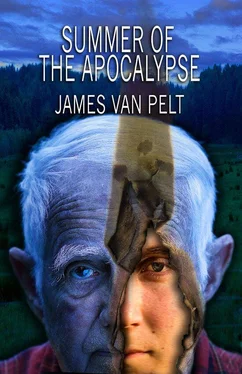Pope squinted at the big man. “A library requires more manpower than you would suspect.”
“What do they want?” asked Eric. He wondered if the men who had carried out the execution the day before were in the camp now. A soldier dressed in green, pushing a wheelbarrow, appeared between the tents and headed for the library. He dumped his load between the machine guns and the ditch. Eric strained to see what the small pile was. A second soldier followed the first with a similar wheelbarrow, and after him the line continued.
“Books,” the woman whispered. “Oh, Pope. Do you think they’ve found the Chemistry library, or the Bio lab’s?”
“So much for the ghosts,” said Eric.
“The traps would not discourage them forever,” said Pope grimly. “It doesn’t matter if they did.” Despite his words, he still sagged into his chair, as if someone had severed one of his strings. More books joined the pile, a barrow load every few seconds.
The message booming over the loudspeaker clicked off. Through the open window came the thud of books piling onto books and the metallic squeal of the barrow wheels as the low stack grew and spread out.
Teach said, “Why the library? What’s he want?”
More books hit the ground. Eric looked back. The old woman gripped Pope’s shoulder; he had closed his eyes. Behind them, rows of books spanned the distance from light to dark. Shadowy glass display cases stood beside dusty tables, and Eric imagined students working quietly, heads down, pens scratching notes.
“Many things, I suppose. Federal knows knowledge is power. He fears our existence here. The books frighten him. The building itself too maybe. The campus. We foiled him in Commerce City by luck. I did not even know of him,” wheezed Pope. “I had sent an expedition to warn them about the water, and all but the stubborn moved north and into the mountains three days before Federal arrived. He conscripted the remaining young men, killed most of the others and tortured the oldest to find out where the rest had gone. An eleven-year-old girl saw it all from hiding and warned us of his approach. We had time to prepare.” He coughed dryly into the flat of his hand and wiped it with a handkerchief the old woman gave him. “Federal thinks he is the new Genghis Khan, riding with his warriors over the wastes of the world. He thinks we will oppose him, so he decided to eliminate us first. He thinks that our power comes from the books. Just the Old Science between him and a crown. The man who would be king of nothing.” Pope coughed again, then said to the woman, “Contact the staff. Events are moving faster than I planned.” She nodded and disappeared between the rows.
“Why nothing?” Eric paid attention to the men piling books. At first he thought that they were innumerable, the uniformed men coming like an infinite line of men and wheelbarrows, but he’d seen the same soldiers several times now, and he realized there must be only fifty or so of them.
“We have preparations to make. But come, I will show you why Federal is a fool.” Pope turned his chair and wheeled himself to the elevator. When he reached the doors, he looked back at Eric as if to say something, then frowned. “Where is your young companion?” Teach had gone. Puzzled, Eric said, “My grandson and two of his friends may have followed us here. Perhaps Teach went to look for them.”
Pope grimaced. “That complicates matters, but nothing can be done about it.” Another floor up, Pope led Eric into what looked like a fully equipped radio lab. Silver and black consoles packed a counter top that ran around the large room. Eric found the soft, electric lighting bouncing off the dust-free surfaces nostalgic, reminding him of his dentist’s office, everything clean and fingerprintless.
“Federal’s ambitions may be larger than the world. Do you know anything about SETI?” asked Pope as he flipped several switches. A low, subsonic hum that Eric felt in his teeth filled the room. Pope continued. “It was the Search of Extraterrestrial Intelligence. C.U. took part, as did numerous other universities, building huge radio dishes aimed at the stars specifically with the idea of picking up other civilization’s signals.” Two large speakers mounted next to the ceiling on shelves hissed into life when Pope rotated a dial on a console packed with needle gauges. Lightly, the smell of ozone and warming electrical components filled the room. “We never found any. Why not?” He twisted another dial, and the speakers crackled as Pope rotated through the radio bands. “The SETI project theorists struggled with several possibilities: one, we weren’t searching the right bands. Maybe extraterrestrial communicated with gravity waves or ESP. Two, our equipment wasn’t sensitive enough to pick up their signals, or three, we were alone.”
He threw a switch and spoke into a microphone. “Staff members,” he said, “take your positions. We are at…” He glanced at his watch. “…five minutes and holding. Wait for my signal please.” Then he continued, as if he hadn’t interrupted himself. “Millions of star systems with planets are within radio distance of Earth.” Pope hunched forward. The dial he reached for was an uncomfortable reach for a man in a wheel chair. “Millions of chances for intelligent life to develop, and it might have. But time is vast, and maybe intelligent life isn’t stable. Perhaps it’s an evolutionary dead end. Intelligence just flickers in time and we have missed it all around us in our own eighty-year radio flicker.” He rotated the dial from one extreme to the other, and only light static came from the speakers.
Assembled on the shelf next to the radio array sat an obviously home-made panel. Over a hundred toggle switches pointed down, each neatly labeled with a number. On the wall, along with other charts, diagrams and pictures, hung a map of the campus with corresponding numbers marking buildings and the gaps between them. Pope flipped a switch to one side of the panel, and small lights glowed red above all but two of the switches. He tapped them both with his fingernail. One lit, but the other stayed dark. He spoke into the microphone again. “Davis or Courtney, check connections on fifty-seven.” A speaker crackled on the radio panel, and a sexless, nervous sounding voice said, “Fifty-seven. Yes, sir.”
“What’s all this?” asked Eric. He bent down and looked past Pope’s knees and under the shelf. A massive bundle of wires from the panel plunged through a sloppy hole in the sheet rock.
“Old science for Federal,” said Pope. “As I said, we had warning he was coming. But I’ve always known about him. My real preparations started the summer I realized I wasn’t going to die in the plague, sixty years ago.”
Pope turned off the panel lights and sighed deeply, and in the sigh Eric heard a profound sadness. “It is difficult to accept, but all the evidence, all rational thought argues that humanity is the sole intelligence in the universe. There is no one out there.”
Pope went back to the radio array and rotated the dial again. Other than a steady beeping that Pope identified as a satellite signal, he found nothing. He said, “But I’m not scanning the stars anymore. My equipment is now tuned to receive Earth’s signals, and I have picked up no other stations for years. I am searching the right bands. My equipment is sensitive enough. Like the SETI project years ago, I am left with only theories to explain this. One, nobody else is signaling, or two, we are alone. Undamaged radio equipment must exist everywhere, in every corner of the Earth. The ability to power it, and the knowledge to use it must still survive if the percentage of surviving population is similar elsewhere as it was here. I now ask the same questions that deviled SETI. Why are the radio waves empty? Why has no one visited us?” Pope’s milky eyes blazed at Eric; his knuckles whitened on the wheel chair arms. The same voice broke in on the radio again. “Loose wire at fifty-seven. Should be good now, Sir.” Eric thought of the small parties of explorers who had left Littleton over the years, one trying for Colorado Springs, one for Kansas City, one for Salt Lake City, that had never come back.
Читать дальше












